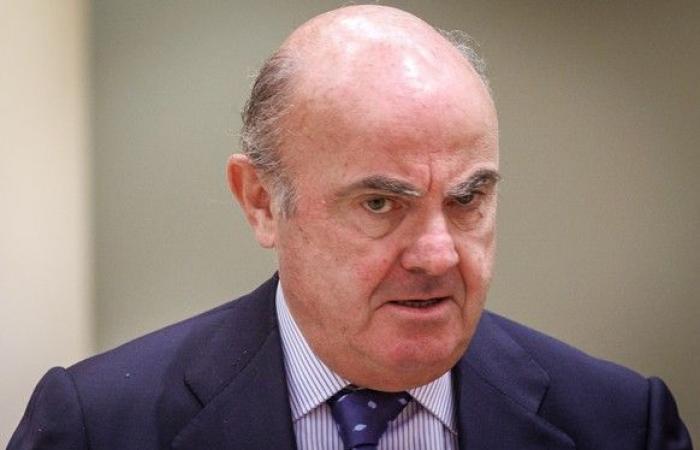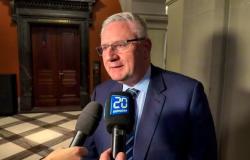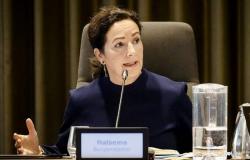The European Central Bank.Keystone
The vice-president of the ECB, Luis de Guindos, expressed on Monday his fears of a US budgetary slippage under Trump, accentuating uncertainty for the euro zone.
18.11.2024, 12:2318.11.2024, 12:24
The vice-president of the European Central Bank (ECB), Luis de Guindos, expressed concern on Monday about a possible fiscal slippage in the United States under the upcoming Trump presidency, worsening the uncertainty weighing on growth prospects in the euro zone.
In the United States, where the public debt ratio is close to 100% and the budget deficit close to 7%, President-elect Donald Trump has promised to reduce taxes without curbing public spending, recalled Mr. de Guindos at the opening of a banking conference in Frankfurt. The central banker warned:
“This could result in an additional budgetary policy on top of the 7% public deficit and thus cause concern on the markets.”
Luis de Guindos.Keystone
The prospect of inflationary policies during Donald Trump’s second term – customs duties, tax cuts and an increase in the budget deficit – has already had an effect on the dollar, which has appreciated significantly in recent days against the euro.
Within the ECB, concerns have shifted in one year from a risk of inflation that is too high to that of growth that is too sluggish.
“Comparing the current situation to that of a year ago, the balance of macroeconomic risks has shifted from concerns about high inflation to fears for economic growth,” Luis de Guindos said in his speech .
Outlook “clouded by uncertainty”
The inflation rate in the euro zone is on track to stabilize at 2%, the ideal score targeted by the ECB. However, economic activity “was weaker than expected” in the last quarter and this led the institution to cut its economic projections twice in recent months.
The outlook remains “clouded by the uncertainty surrounding economic policies and the geopolitical landscape, both in the euro zone and globally,” added Luis de Guindos.
Trade tensions “could further intensify, increasing the risk of extreme events materializing,” he argued, without specifying which ones, while the ECB will present its half-yearly report on financial stability on Wednesday.
These “cyclical headwinds” will only “aggravate the structural problems of low productivity and low potential growth in the euro zone,” according to Luis de Guindos. (jah/ats)
News on the economy? This way
Show all articles
Switzerland is facing a labor shortage: up to 460,000 workers could be missing by 2035, according to Economiesuisse and the UPS.
The labor shortage is a known challenge for Switzerland. Economiesuisse and the Swiss Employers’ Union (UPS) have now provided figures to support their concerns: by 2035, there could be a shortage of 297,000 employees, or even 460,000.







